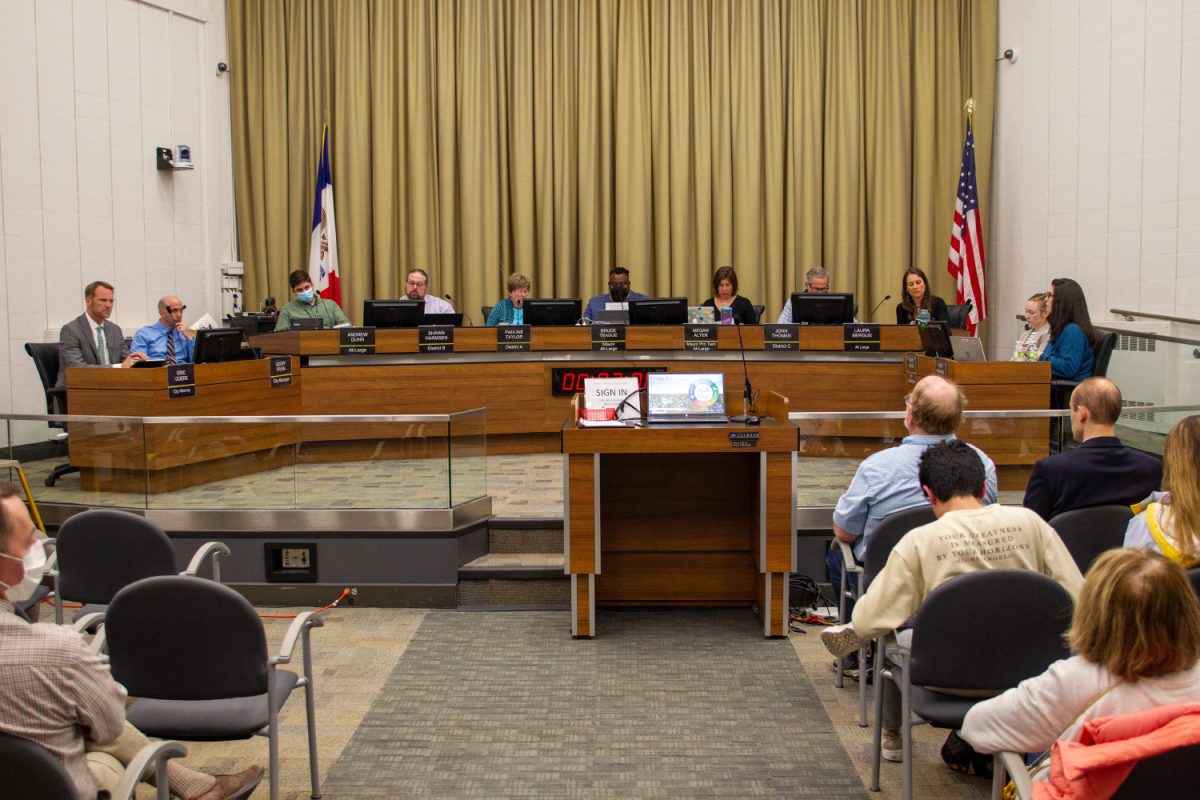The Iowa City City Council changed the way its public comment session works in an attempt to abate a trend of offensive and racist comments being made in recent city council meetings.
Since Nov. 6, members of the public who join the meeting via Zoom are not allowed to comment during the community comment session, a period when residents can speak about non-agenda items or topics.
The offensive comments first began at the council’s Oct. 17 meeting, seemingly in relation to a statement Mayor Bruce Teague made about the Israel-Hamas attack before the meeting’s start.
In this statement, Teague said the city stands behind those in the community impacted by the conflict and invited the public to join him in a moment of silence. Teague did not take a stance on the conflict and offered his condolences to all of those affected.
Shortly after this statement, several antisemitic and racist comments were made by a handful of commenters over Zoom. This continued into the next meeting on Nov. 6, with racist and homophobic slurs also being cast toward the mayor.
At the Nov. 6 meeting, Teague announced that the public comment session on non-agenda items, which is held towards the beginning of the meeting, will now not allow speakers from online to comment during this time. The change was added in a written statement in the Nov. 6 agenda and has been kept in meetings since.
Speakers are still allowed to comment online as well as in-person in regard to agenda items as the council gets to them, but the mayor can cut the speaker off if they stray from the topic of the agenda item.
RELATED: IC City Council denounces hate speech and antisemitism in public comments
Teague said this change was made in response to the recent offensive comments made over Zoom during the community comment session.
“It was very disturbing, the hateful language that was used, and it was decided that we needed to do something different,” Teague said. “Not only has this been happening here at our council meeting, but it’s been happening across the country, and so we wanted to take a step to minimize that harm and that hateful speech.”
Teague said this change was agreed upon by the council, and the council will continue to monitor the situation to make future decisions on any further changes as needed.
In the state’s public meeting laws, there are no requirements for a council or other public entity to have any sort of public comment session at all unless the council is discussing an item that requires a public hearing, such as voting on the city budget.
Iowa City City Attorney Eric Goers said this is not the first time the council has made changes to the way its public comment session operates. In March 2022, the city made a change that councilors couldn’t answer questions or comments from commenters until after the commenter had left the speaking podium.
Randy Evans, the executive director of the Iowa Freedom of Information Council and an expert on public meeting laws, said he commends Iowa City for taking this step instead of entirely taking away the opportunity for non-agenda public comment or accessing the meeting using Zoom.
Since the pandemic, broadcasting meetings over Zoom has been a helpful way for community members to access meetings they may otherwise not be able to attend because of things like schedule conflicts or the inability to get transportation to the meeting chambers, Evans said.
“It’s one of those uncomfortable situations where sometimes it’s the behavior of the public that is feeding into the response that city leaders are making,” Evans said.
Several Iowa City councilors and staff have made statements denouncing the offensive remarks made during recent meetings, both inside and outside council chambers. Mayor Pro Tem Megan Alter published a letter to the editor in November where she condemned the hateful speech.
“We will do everything in our legal power to mitigate and eradicate hate in whatever form it appears before us,” Alter said.
At the most recent city council meeting on Nov. 21 there were no reported instances of offensive comments being made during any public comment sessions.



